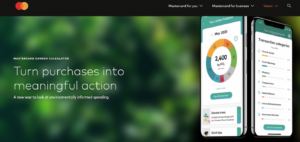Dozens of countries have seen their leading financial institutions and banks launch "carbon footprint trackers," ostensibly to combat climate change, for their clients.
The proliferation of the carbon tracking software follows the World Economic Forum (WEF) announcing that its member companies were working to implement a similar agenda as part of its broader climate change efforts. The WEF has also been accused of exploiting climate change to advance a social and political agenda rooted in "social credit scores" and digital identity tracking – similar to how the group weaponized COVID-19 to implement its "Great Reset" agenda.
Mastercard, for example, launched a “Carbon Calculator” feature that would "offer consumers an estimated carbon footprint for each of their purchases." Developed in collaboration with Swedish fin-tech Doconomy, it is currently used in 25 countries.
“By having clear insight into the effect your day-to-day footprint has on the planet, you can make small adjustments resulting in real change,” explains a summary of the Mastercard program.

Canadian financial co-operative Vancity recently launched a program that will track the estimated carbon emissions of its Visa credit card holders.
"The Vancouver-based credit union says all Vancity Visa credit card holders will be offered the data, which will also include how their spending-linked emissions compare nationally and which purchases have the highest environmental cost," explained an announcement.
The feature was developed in partnership with German fintech company ecolytiq.
Similarly, in Australia, Commonwealth Bank launched a program providing a "real-time carbon output" figure to 250,000 users.
“The first phase of the partnership will allow a select group of retail customers to view their carbon footprint via the CommBank app and offset their previous month's transactions by purchasing carbon credits. This new feature will be available to all retail customers next year,” explained a summary of the program.
The press release continues:
"Our data capability will provide greater personalisation for customers overtime, including more granular information about their carbon footprint with the option to offset individual transactions."
Carbon offsetting involves measuring how much carbon everyday activities, like driving your car, emit and then compensates your emissions through the benefits of green initiatives, such as Australian bushland regeneration.
The advent of carbon tracking software comes amidst a broader push from the WEF to roll out a broader digital identity tracking system.




